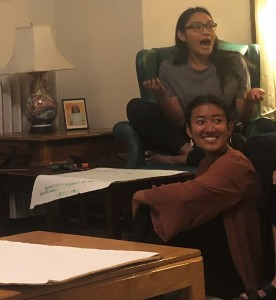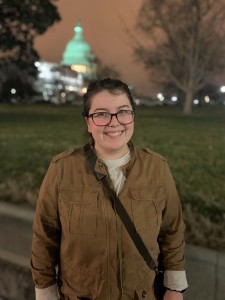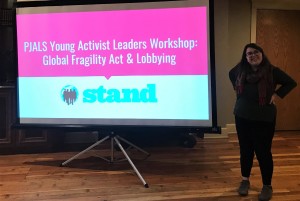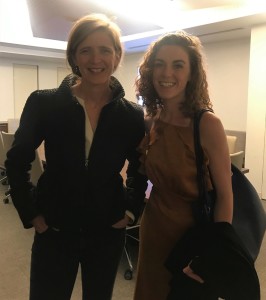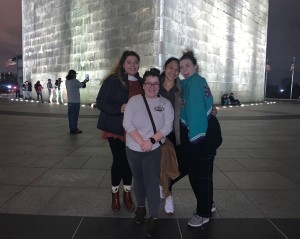Special Update: Armenia & Azerbaijan
On September 27th, a decades-long unresolved conflict between Armenia and Azerbaijan hit its most violent point since a cease-fire brokered in 1994 with heavy fighting from both sides. This conflict centers around the disputed Nagorno-Karabakh region which traditionally belongs to Azerbaijan but has a majority Armenian population. Nagorno-Karabakh voted to become a part of Armenia as the Soviet Union collapsed in the late 1980s- this led to a full out war with reports of ethnic cleansing and massacres committed by both parties. There have been multiple flare-ups since 1994, but none as significant as the one that is currently occurring.
Nearly 800 Armenians have died in this conflict since September 27th. These civilian casualties are largely due to war practices that do not attempt to protect civilians, such as the use of artillery salvos and ballistic missiles in populated areas. Amnesty International, Human Rights Watch, and other human rights groups have called for an immediate end to these practices. The conflict also threatens to spiral into a regional war with 1,000 Syrian fighters employed by a private Turkish security force sent to support Azerbaijan in the first days of October. This Turkish support of Azerbaijan threatens to catalyze Russian involvement in the area in support of Armenia.
Attempts at peace talks have been unsuccessful so far. Fighting partly subsided on October 10th after a cease-fire came into place, but both sides were accusing the other of breaking the agreement before it started. By midnight fighting had resumed. A break in fighting was once again attempted on October 18th with both sides issuing statements declaring a “humanitarian truce.” This attempt also failed within the day. Misinformation has repeatedly been cited by foreign news outlets as the cause for these failures as it is likely that false videos have been used as reasoning for breaking off agreements. A new cease-fire agreement set to start on the morning of October 26th was negotiated in a meeting between Armenia, Azerbaijan, and senior U.S. diplomats.
Genocide Watch, a non-profit working to predict, prevent, stop, and punish genocide, has released a genocide emergency alert on Azerbaijan’s atrocities. They also note that this atrocity has reached Stage 9: Extermination and Stage 10: Denial of the Ten Stages of Genocide.
Sudan and South Sudan
Sudan
On October 3, around a year after peace talks began, the Sudanese transitional government and several rebel groups signed a peace deal that promises to provide monetary aid for conflict-affected regions and plans for the return of internally displaced peoples. Despite this, civil unrest continues throughout the country. After the governor of the eastern Kassala province was sacked, large protests caused authorities to impose a curfew in Port Sudan and Suakin. At least six people have died and 20 have been injured due to the protests, which stem from an ongoing conflict between two ethnic groups in the region. Protests have also broken out in Sudan’s capital. The Resistance Committees, which led the protests against al-Bashir last year, organized to call for improved living conditions and results from an investigation carried out on the violent crackdown against Khartoum protests in June 2019.
On October 19, U.S. President Donald Trump announced that Sudan would be removed from the U.S. State Sponsor of Terrorism list on the condition that Sudan pay a $335 million compensation for U.S. terror victims. Congress has 45 days to object to this motion, and, if passed, grant Sudan a new status not seen since 1993 when it was placed on the blacklist.
South Sudan
On October 5, a group of UN World Food Program boats was attacked near Renal town in northern South Sudan, leaving one missing and three injured. The WFP was providing aid for victims of recent flooding in the country and followed a similar attack on World Vision offices in early October. Violence also continues in South Sudan’s Tonj East County, where fighting between the Thiik cattle community and Akok cattle camp left nine dead and 30 injured. The state’s governor has called upon local communities to refrain from engaging in inter-communal violence for the sake of secure aid delivery to these areas.
Sudan and South Sudan have made little progress in resolving the disputed Abyei area, an oil-rich region commonly subject to attacks on villages. While peace processes are not yet in the works, the UN Security Council noted the importance of the increased dialogue between the two nations in strengthening their relationship.
Middle East
Yemen
Tensions have escalated between the Houthi rebels and the Saudi-led coalition during the month of October. On October 24 the Iran-backed Houthis launched an attack in Saudi Arabia utilizing drones, targeting the Jizan and Abha airports and an air force base in Khamis Mushait. The Saudi-led coalition, however, stated that it intercepted drones going towards the southern region of Saudi Arabia, making it unclear if any civilians were hit. Since early October, more Yemeni civilians have been reported killed or injured in recent fighting. Two Yemeni civilians were killed in a shelling launched by the Houthis in the port city of Hodeidah. Hodeidah has seen increasing disruptions and turmoil despite the Houthi rebels and the government striking a ceasefire deal in 2018. These risks are worsening the widespread famine and starvation already plaguing Yemeni civilians in the country, as both sides of the conflict use aid disruptions as a tool of war.
Syria
On October 15, Kurdish authorities released 631 ISIL prisoners in northern Syria who have, according to the Syrian Democratic Council, expressed regret about joining ISIL and are ready to reintegrate into society. The move comes as part of a general amnesty in the U.S.-supported military region, and all those released were noted to have served at least half of their sentences.
On Monday, October 26, over 50 Turkish-backed fighters were killed after an airstrike in northwest Syria. Syrian opposition forces blamed Russia for the attack, vowing to rebel despite a recent increase in daytime airstrikes. The vast number of civilian deaths as a result of the Syrian War was recently investigated in a Human Rights Watch (HRW) report released on October 15. The HRW concluded that the Russian and Syrian offensive’s attacks on civilians could amount to war crimes and crimes against humanity. The report noted that between April 2019 and March 2020, the Russia-Syria alliance launched 46 attacks on public places including hospitals, markets, and schools, and called for targeted sanctions on Syrian and Russian military commanders.
Asia
Burma
With Burma’s November 8 elections only two weeks away, many issues with this election have arisen. The ruling National League for Democracy Party has excluded all Rohingya from voting or running for office, canceled elections in nine of seventeen townships in the Rakhine state due to conflict, and banned the country’s largest election monitoring group. Conflict continues to escalate in the Rakhine state. Countless sources from first-hand reports, video evidence, and satellite imagery analysis show the atrocities committed by the Burmese Military. Their fighting has traumatized, injured, and killed innocent people. Additionally, Burma’s government has kept about 130,000 internally displaced Rohingya in inhumane conditions in refugee camps for eight years now with no sight of when they can return home.
Kashmir
Unease between the Kashmiri people and the government has been rising expeditiously, especially now at the release of the former chief minister, Mehbooba Mufti. She was freed by the Indian authorities after 14 months of house arrest. Mufti was detained on August 5, 2019, after Kashmir was stripped of its right to self-govern. The Indian government has a history of illegally detaining Kashmiri activists, politicians, and teachers. Even though several political leaders have been released, thousands are still detained unconstitutionally all over Kashmir. Now after Mufti’s release, seven political parties of Jammu and Kashmir mobilized at Mufti’s residence in Srinagar to format their recently formed alliance. The alliance aims to reinstate Article 370 of the Indian constitution, which would grant Jammu and Kashmir autonomy and specify the limits and allowances for their self-government.
East Turkistan (Xinjiang, China)
On October 21, a parliamentary committee in Canada announced that they deem the current atrocities occurring in China against the Uyghurs and other Turkic minority groups should be labeled as a genocide. This announcement comes after a Chinese envoy to Canada warned against labeling the mass detentions as a genocide. The members of parliament on the international human rights subcommittee have called for Magnitsky sanctions to be made against China in the coming weeks. In addition to labeling the atrocities a genocide, they are also calling on other world powers, including the United States, to do the same. China’s foreign ministry has denied the allegations, calling them “groundless.”
In the United States, the Uyghur Forced Labor Disclosure Act passed in the House of Representatives on September 30 and has been moved into the Senate. The bill would require public companies to consistently review and audit supply chains to monitor for forced labor practices. On October 16, Robert O’Brien, U.S. national security advisor, said that “if not a genocide, something close to it [is] going on in Xinjiang,” during an online event. O’Brien also said that the United States is considering how to best approach the issue on the global stage.
Central Africa
Central African Republic
Russia expanded its influence in the Central African Republic (CAR) by opening a representative office and sending the state ten armored vehicles. CAR hopes to have their arms embargo lifted with the help of Russia, which would allow Russia to supply CAR with more weaponry. In a report released this month, Amnesty International explained that the Special Criminal Court (SCC), a “UN-backed hybrid tribunal” in the Central African Republic, has been ineffective in upholding justice in the country. As a result, many criminals and abusers who have engaged in “unlawful killings and sexual violence” have not been held accountable for their crimes and human rights violations. According to Samira Daoud, an Amnesty International regional director, UN member states should “consider making contributions to the SCC” in order to help it properly serve its purpose.
Cameroon
The English-speaking regions (mainly North-West of Cameroon) reopened around 140 of the 475 schools after a 4-year closure. The four-year conflict commenced in 2016 when civilians emerged to end the superfluous amount of support of French-speaking individuals in a nation that has more than one official language. The UN has reported more than 3,000 civilians are dead or displaced due to the ongoing violence in the North-West regions. The recent opening of schools seems to be a positive step to end the violence against women and children; however, many separatist fighters disagree with the re-opening of schools. On October 24, attacks on school children in the city of Kumba (a South-West region) killed eight children and injured about twelve others. The attacks occurred at the Mother Francisca International Bilingual Academy.
Security forces attacked peaceful protestors with tear-gas and water cannons. The security forces even detained the opposition leaders and supporters. Since September 22 and continuing in October, security forces have arrested and beat individuals for exercising their rights and political views. MRC leader, Maurice Kamto, has been under house arrest since September. On October 5th, Kamto’s lawyers requested the release of the opposition leader before the Yaounde Court of First Instance. On October 12, 14 UN human rights experts called for the release of the opposition leaders, including Kamto and political activists.
Democratic Republic of Congo
The Democratic Republic of Congo has seen a recent uptick in the amount of people fleeing the country. In October, over 50,000 people left because of the fighting in North Kivu. The UN Refugee Agency has increased its support in the area by providing relief items, constructing emergency shelters, and helping communities bolster protective mechanisms. Between October 26 and 27, the Congolese Army made strides in taking down rebel groups near their eastern border. On the 26, the army took control over the Burundi rebel groups headquarters, as well as fighting against the Rwandan rebel group. Reports the next day stated that the Congolese army had killed 27 rebels between the two groups.
Refugees
On October 19, the U.S. Supreme Court agreed to review the Trump administration’s policy requiring asylum seekers to wait outside the country while their applications are being processed. The case will not be decided until at least after the election, meaning that migrants waiting in Mexico near the U.S. border will have to remain there in the interim.
With the end of the fiscal year on October 1, the United States has recently announced that it took in a mere 11,814 refugees during FY 2020, only about two-thirds of the 18,000 person limit and the lowest number of refugees admitted in a fiscal year on record- it is important to note, however, that overall immigration and movement between countries was limited this year due to the pandemic.
The United States is not alone in its low acceptance of refugees- the number of refugees accepted by Australia reached a record low this year. There have also been more active attacks on refugees. On October 23, several independent news organizations released a report detailing how Frontex, the border and coast guard agency of the European Union, has been involved in illegally sending refugees back to their home countries. In June, a Frontex vessel assisted Greek authorities in stopping a vessel of refugees before it had even reached Greek shores, and this was not an isolated incident. Greek authorities have repeatedly engaged in similar behaviors, known as pushbacks, and Frontex authorities, despite being aware of their violations of EU laws, did not intervene. Greece is not the only EU country to have conducted pushbacks-Croatian authorities have long been accused of sending refugees back to their home countries after they had reached land, and the Danish Refugee Council documented several incidents that occurred between October 12 and October 16. These were reportedly violent and aggressive, with some migrants accusing Croatian authorities of physical and sexual abuse. This violence against and refusal to help refugees is reflected throughout the world, highlighting the need to do more to protect refugees.
–
Megan Rodgers is a senior honors student at the University of Arkansas studying International Studies, Political Science, and Spanish. She is one of STAND’s co-student directors for the 2020-2021 academic year. Megan contributed to the Armenia portion of this update.
Caroline Mendoza is a student at UCLA studying international development. Caroline serves on the Managing Committee as a co-education and co-Burma committee lead. Caroline contributed to the Sudan and South Sudan and Syria portions of this update.
Alondra Becerra is a student at Texas State University studying international relations and is a member of the Yemen, Sudan, and South Sudan Action Committees. Alondra contributed the Yemen portion of this update.
Grace Harris is a senior at Tampa Prep High School. She has been a member of her school’s STAND chapter since her freshman year and currently serves as its president. With STAND, Grace is the co-Xinjiang and co-High School Outreach lead. Grace contributed to the Burma portion of this update.
Dorene Hantzis is a student at Terre Haute South Vigo High School, and a chapter leader and Indiana State Advocacy Lead. She is also a partner with Together We Remember to remember victims of identity-based violence. Dorene contributed to the Kashmir portion of this update.
Audrey Firrone is a student at the University of Memphis and is a member of the East Turkistan (Xinjiang) Action Committee. In addition to working with STAND, she also works with the Free Uyghur Student Coalition. Audrey contributed the East Turkistan (Xinjiang) portion of this update.
Sulphia Iqbal is a senior at South Brunswick High School and a member of the STAND Yemen and Burma Action Committees. Sulphia contributed to the Central African Republic portion of this update.
Saroona Khilji is a psychology student at George Mason University, and a member of STANDnow. Saroona contributed the Cameroon portion of this update.
Jenna Walmer is a graduate student at West Chester University of Pennsylvania working towards an M.A. in Holocaust and Genocide Studies and an M.A. in General Psychology. With STAND, she is the co-Education and co-Policy lead. Jenna contributed the Democratic Republic of the Congo portion of this update.
Mira Mehta is a student at Westfield High School, and a co-lead of the Yemen Action Committee. Prior to this, she was the New Jersey State Advocacy Lead and served on the STAND Communications Task Force for two years. Mira contributed the Refugees portion of this update.


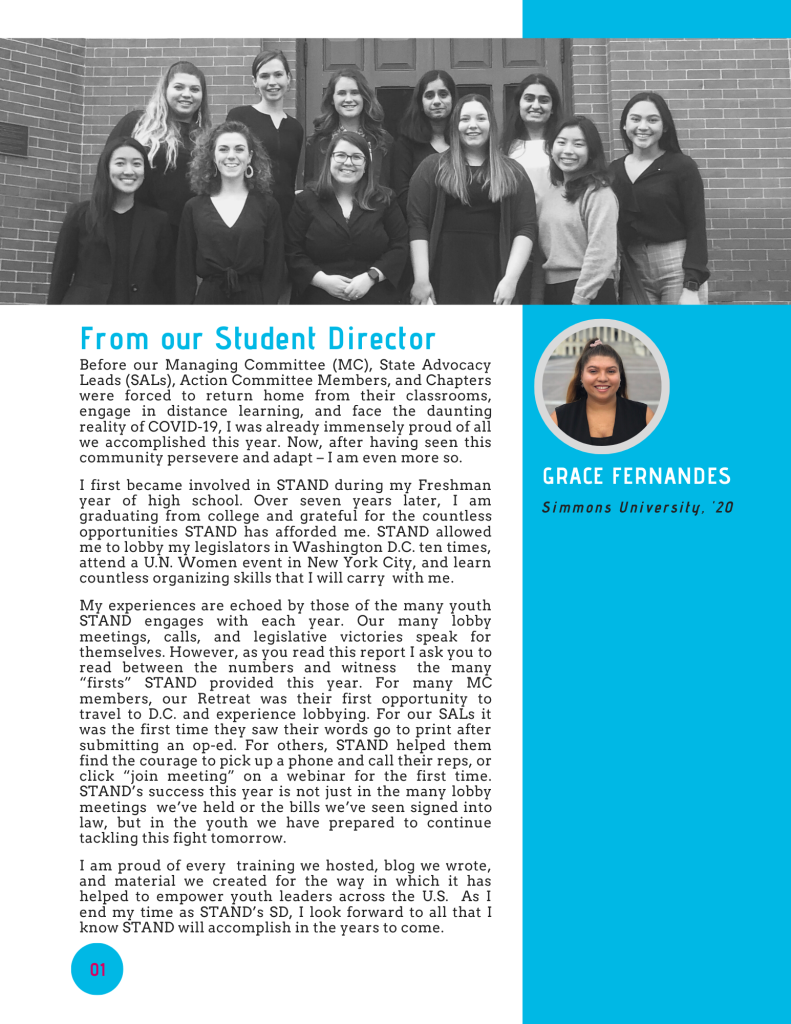
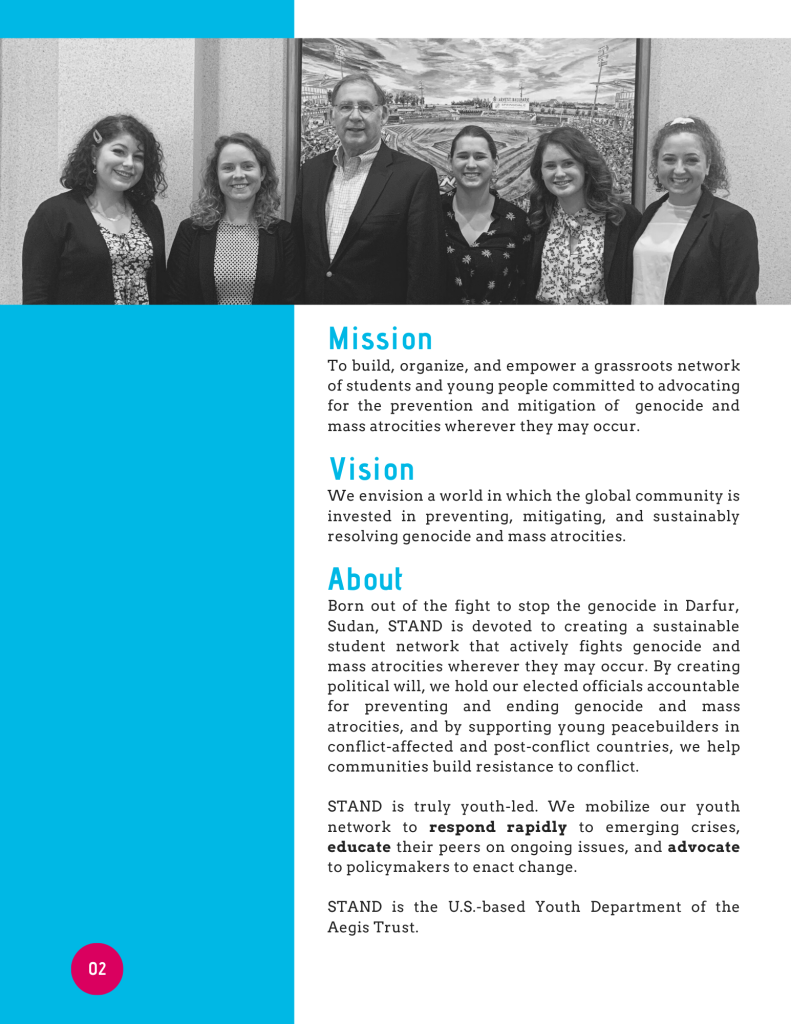
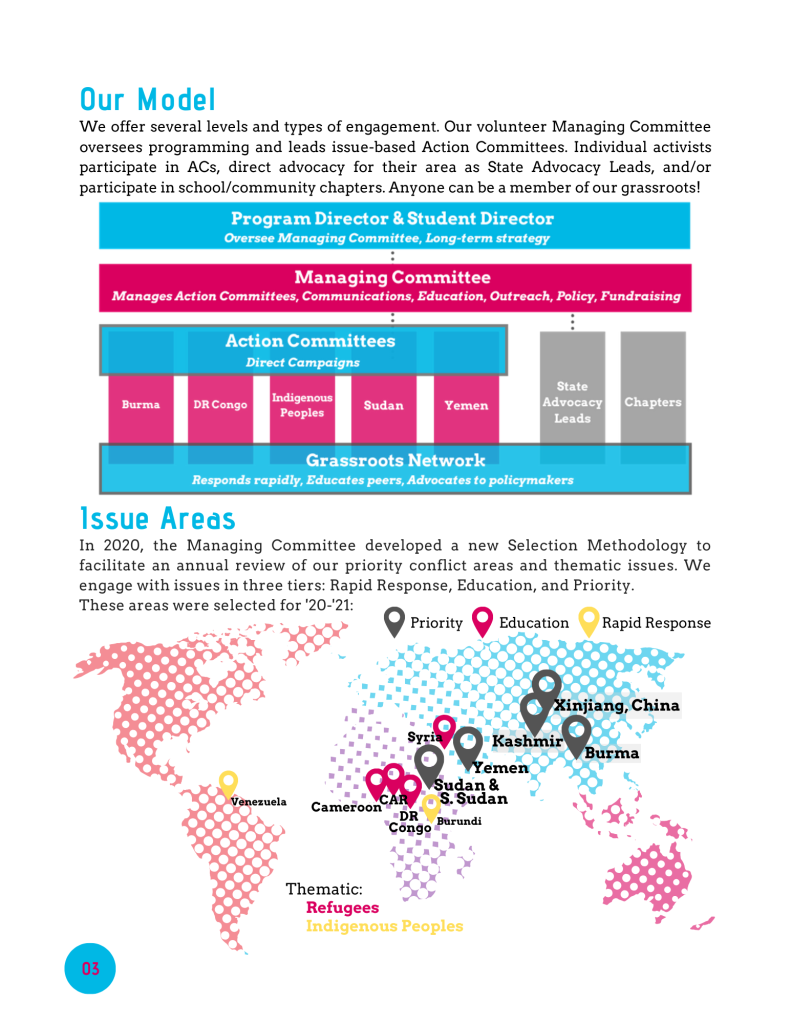

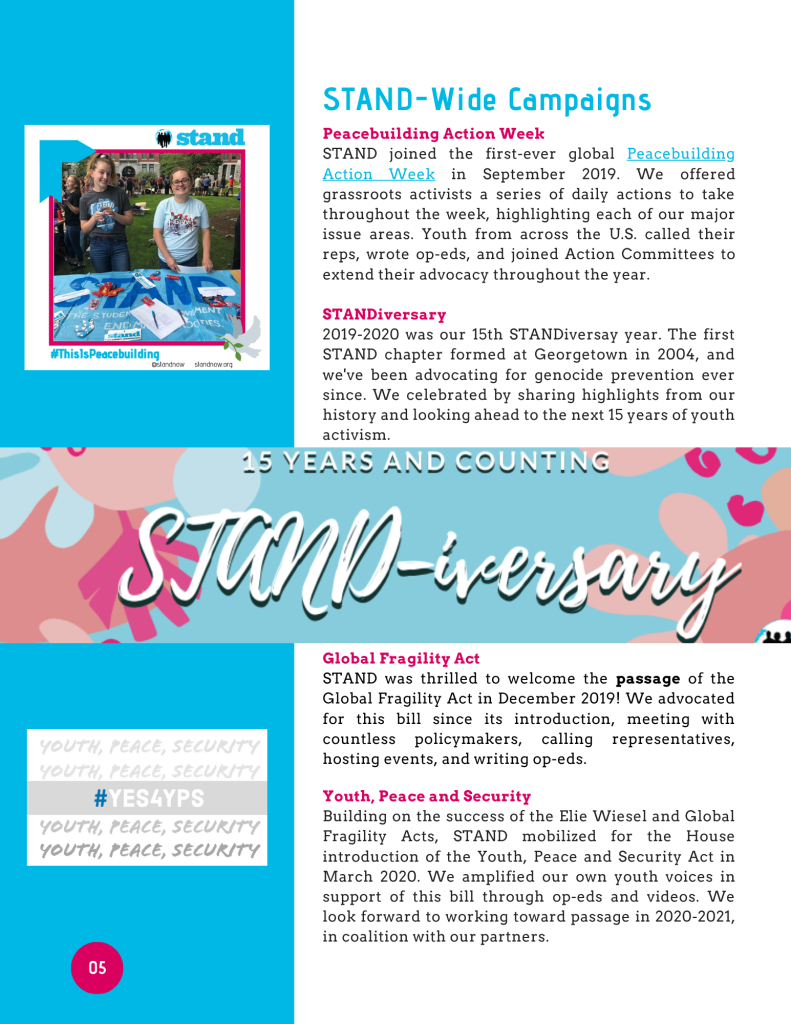
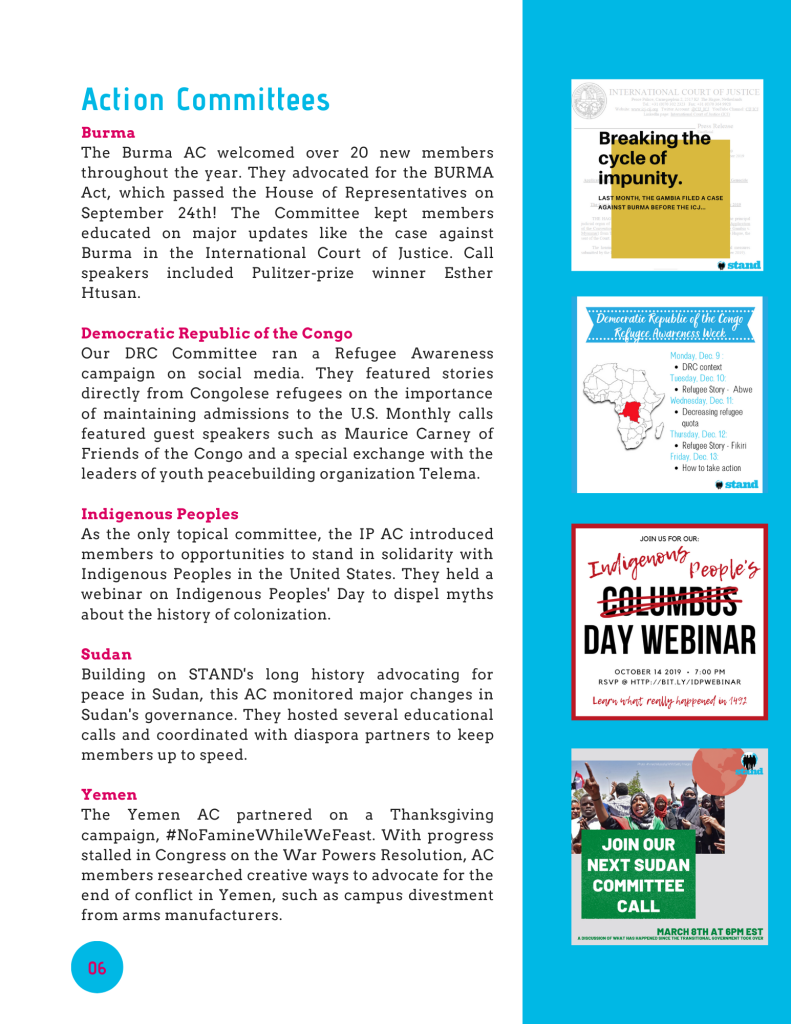
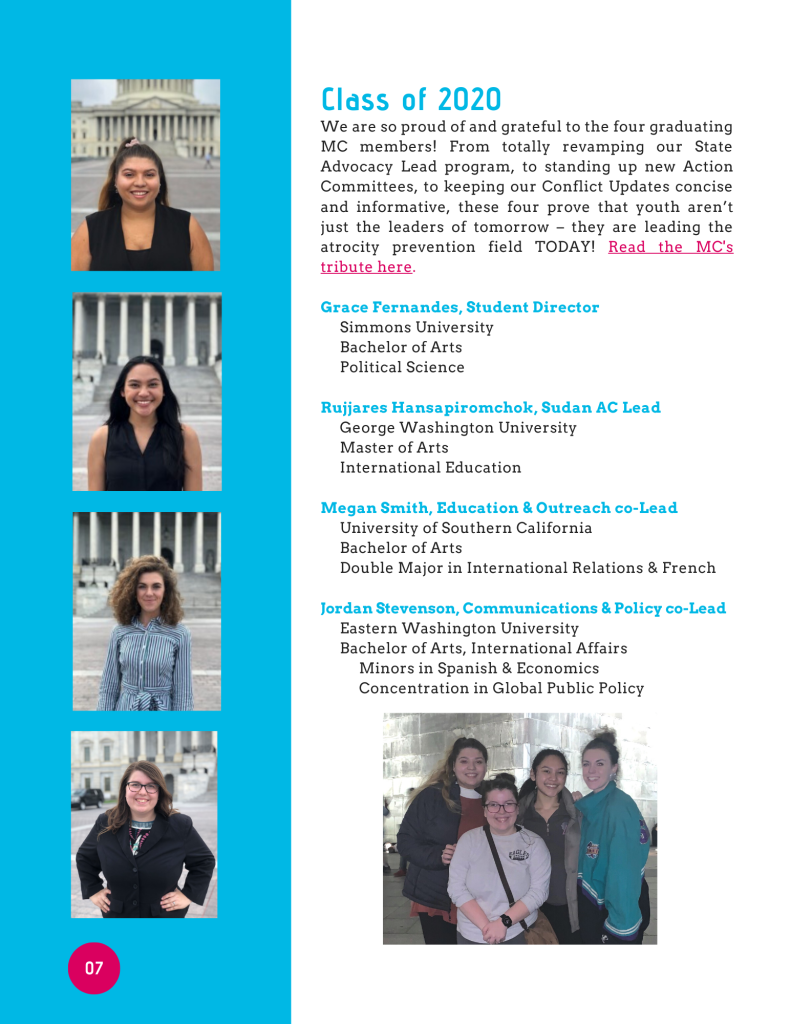
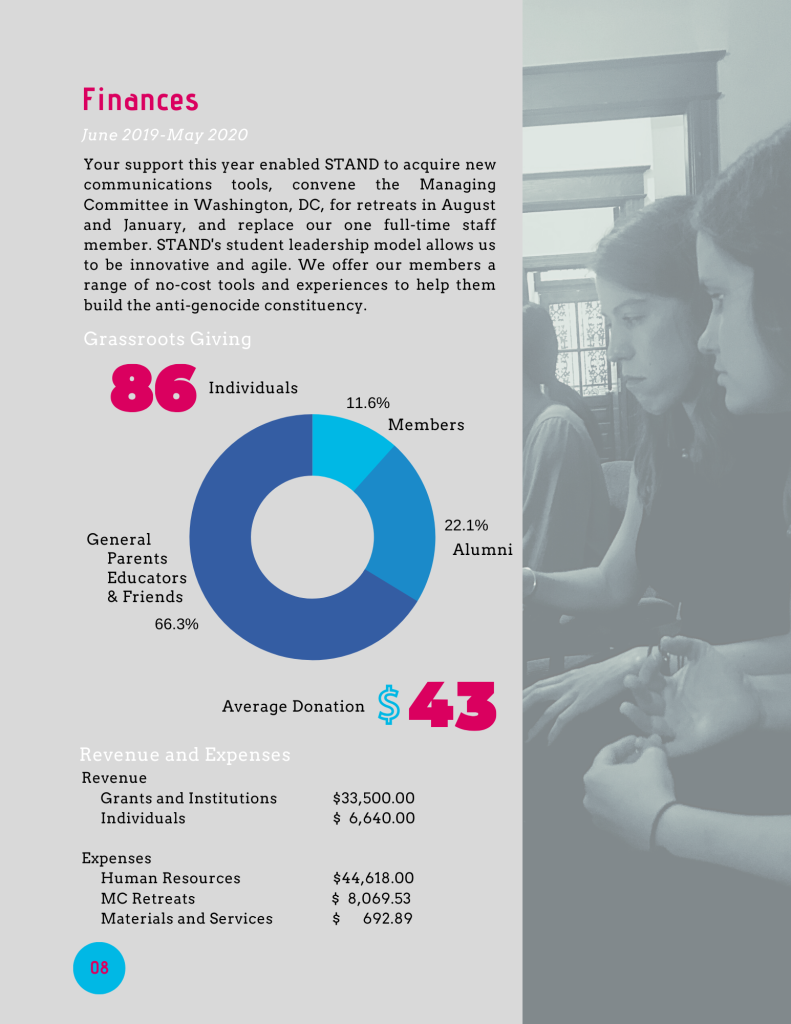

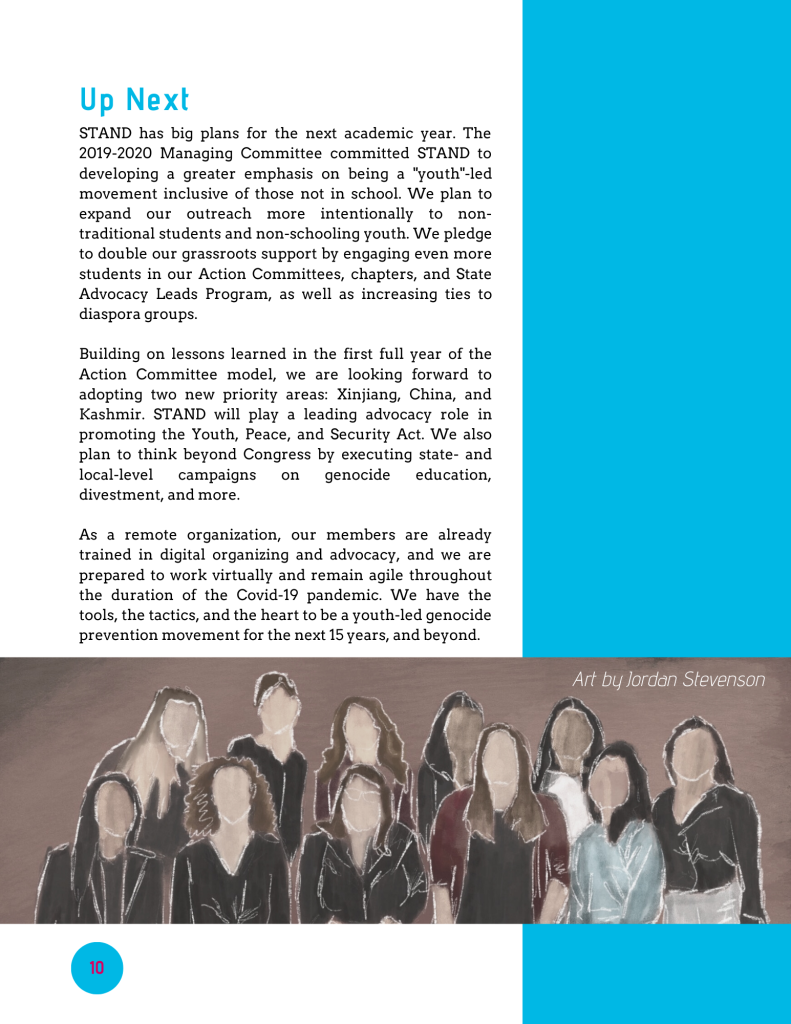
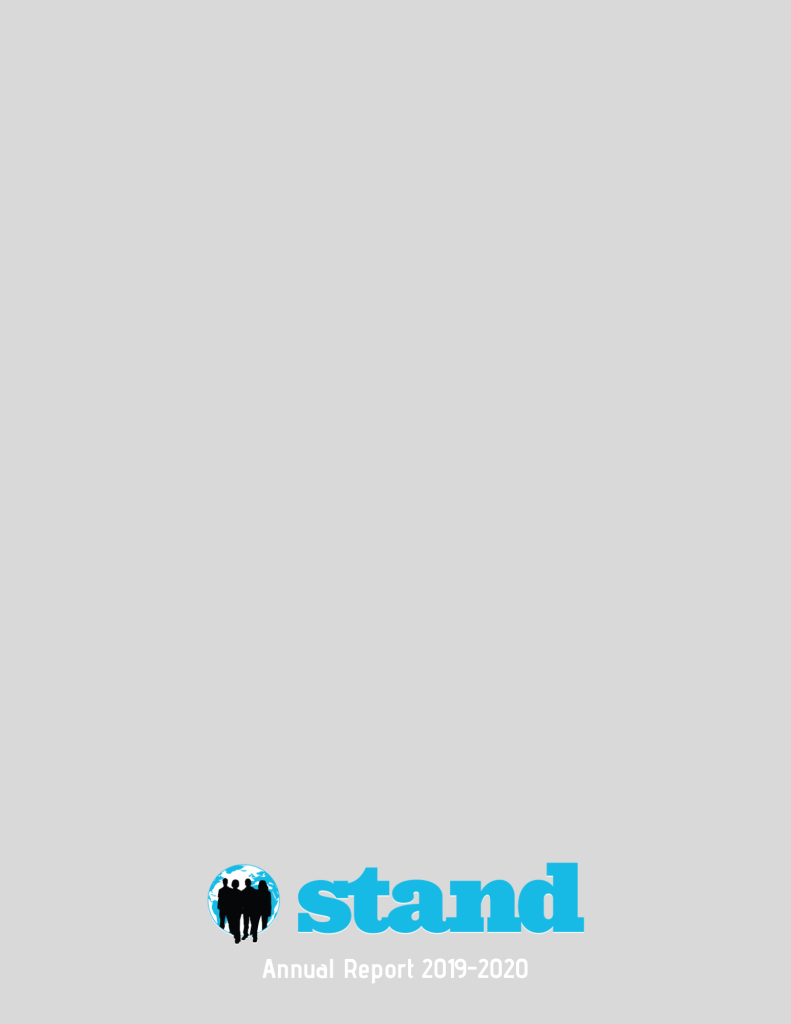
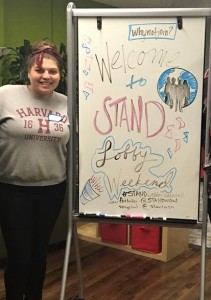
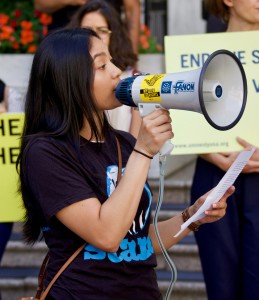 e dangerously funny. Thank you so much for consistently bringing humor and compassion to the team this year! You always give everyone your full presence, even working on a team with younger members. We were so lucky to have your thoughtful leadership on the Sudan Action Committee this year. I was so impressed by how you put the members first and sought new and creative ways to keep them informed and engaged. Please reach out whenever you’re in DC. STAND will miss you so much, but we’ll be happy to see your megaphone-announcing, merch-wearing face on every marketing item for years to come. -Laura Strawmyer, Program Director
e dangerously funny. Thank you so much for consistently bringing humor and compassion to the team this year! You always give everyone your full presence, even working on a team with younger members. We were so lucky to have your thoughtful leadership on the Sudan Action Committee this year. I was so impressed by how you put the members first and sought new and creative ways to keep them informed and engaged. Please reach out whenever you’re in DC. STAND will miss you so much, but we’ll be happy to see your megaphone-announcing, merch-wearing face on every marketing item for years to come. -Laura Strawmyer, Program Director